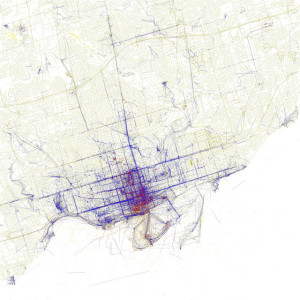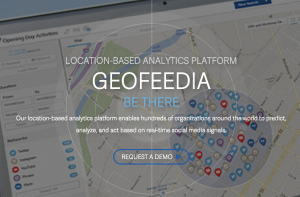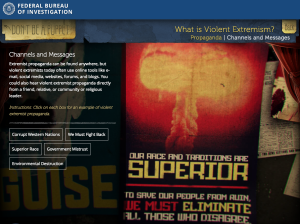I just came across a great French project called Transcrire. The Huma-Num Very Large Facility has built a system for the crowdsourcing of transcription of archival materials. It looks like they have built infrastructure for crowdsourcing (or citizen science) in the humanities. Playing around, it looks very professional.
Rez Infinite for the PS4
I finally got around to downloading and playing Rez Infinite on the PS4. This is an upgraded (hi-res) version of the original which SEGA released for the Playstation 2 and Dreamcast in 2001. The game is a beautiful rail shooter and a music game which produces trance like electronic music (and vibrations) as you play. There is a traveller mode where you don’t die and you can just make music and travel through the spaces. I found myself wanting to repeat levels to continue the beat.
The new 2016 version for the PS4 support VR (though I don’t have it). It also has an extra level called “Area X” which, while more sophisticated, lacks the charming Tron-like graphic imagination of the rest. It would be interesting to map all the references to Tron in Rez – it too places you as a hacker going through a computing landscape.
Polygon has a story on the Rez producer Tetsuya Mizuguchi on his return to music games. The story mentions a Synesthesia Suit (PDF) created to go with VR games like Rez Infinite. Below is a video from Siggraph 2016 to show (feel) of the suit’s capabilities. I’m intrigued by this intersection of art and game around music.
And here is link to a video showing the suit.
2016 Chicago Colloquium On Digital Humanities And Computer Science
I’ve just come back from the Chicago Colloquium on Digital Humanities and Computer Science at the University of Illinois, Chicago. The Colloquium is a great little conference where a lot of new projects get shown. I kept conference notes on the Colloquium here.
I was struck by the number of sessions of papers on mapping projects. I don’t know if I have ever seen so many geospatial projects. Many of the papers talked about how mapping is a different way of analyzing the data whether it is the location of eateries in Roman Pompeii or German construction projects before 1924.
I gave a paper on “Information Wants to Be Free, Or Does It? Ethics in the Digital Humanities.”
Obituary: Kelly Gotlieb was the father of Canadian computing
I recently came across the obituary in the Globe and Mail for Kelly Gotlieb was the father of Canadian computing who passed away on October 16th.
Kelly was in many ways the founder of computing in Canada as he ran the University of Toronto Computation Centre that intsalled the first computers in Canada. The obituary isn’t entirely correct as they mention FERUT as the first computer when it was actually the second computer, the first being the test UTEC Jr. which is mentioned in a Globe and Mail story titled “Junior Electronic Brain Cost $100,000” (Len Schrag, Dec. 13, 1951, p. 4) that dates from 1951.
The obituary also mentions how Kelly Gotlieb mentored Beatrice Worsley. She was one of two hired to go to the UK and figure out how to run the first computers they were installing. She got a PhD. from Cambridge with a dissertation on “Serial Programming for Real and Idealized Digital Calculating Machines” that Campbell (2003) argues was the first dissertation involving modern computers.
When we did a survey of Globe and Mail articles on computing from the early years in Canada we saw a broad curiosity about what computation could do. (Some of this has been reported in Before the Beginning.) We see the Computation Centre working with Music profs in 1957 in a Globe article “Strange Music Made By an Electronic Brain.” We see an article in 1961 that mentions concording and a new IBM coming. In 1964 there is a story about a project McLuhan was involved in to investigate the impacts of technology on culture and vice versa. I suspect Gotlieb was instrumental in promoting these and many other experiments in applying computing to different challenges across disciplines. By all accounts he was generous and a great promoter of computing. As the obituary says,
Dr. Gotlieb was a visionary, not only in the technical issues of machine computation, but also in their potential social implications. In the 1960s, he was chosen by U Thant, Secretary-General of the United Nations, to be one of six world experts advising on how computer technology might assist international development. Years later, he served on Canada’s first federal task force on privacy.
Campbell, S. M. (October-December, 2003). “Beatrice Helen Worsley: Canada’s Female Computer Pioneer.” IEEE Annals of the History of Computing: 51-62.
Rhizome: Net Art Anthology
From Humanist I learned about Rhizome’s Net Art Anthology. For two years they be exhibiting net art works. There are already a couple up there and you can get an email update when a new one gets posted.
The design of the site is simple and loud in a way that reminds me of the early days of the web.
Locals and Tourists: Flickr Collection

Locals and Tourists is a fascinating series of maps that juxtapose who takes Flickr photos locals vs. tourists. The blue is the locals, red is tourists. Above you can see Toronto and how locals take pictures all along Bloor and Queen and up Yonge. Tourists stay downtown.
My Digital Humanities
The folks at #dariah Teach have put together a first of a series of videos on My Digital Humanities. Despite appearing in it, the video seems very nicely produced and there is a nice mix of people. Stéfan Sinclair and I were interviewed together, something that isn’t clear in the first part, but will presumably become clear later.
FBI Game: What is Violent Extremism?
From Slashdot a story about an FBI game/interactive that is online and which aims at Countering Violent Extremism | What is Violent Extremism?. The subtitle is “Don’t Be A Puppet” and the game is part of a collection of interactive materials that try to teach about extremism in general and encourage some critical distance from the extremism. The game has you as a sheep avoiding pitfalls.
Geofeedia ‘allowed police to track protesters’

From the BBC a story about US start-up Geofeedia ‘allowed police to track protesters’. Geofeedia is apparently using social media data from Twitter, Facebook and Instagram to monitor activists and protesters for law enforcement. Access to these social media was changed once the ACLU reported on the surveillance product. The ACLU discovered the agreements with Geofeedia when they requested public records of California law enforcement agencies. Geofeedia was boasting to law enforcement about their access. The ACLU has released some of the documents of interest including a PDF of a Geofeedia Product Update email discussing “sentiment” analytics (May 18, 2016).
Frome the Geofeedia web site I was surprised to see that they are offering solutions for education too.
Access 2016
Yesterday I gave a talk at Access 2016. This conference brings together archivists and librarians interested in library technology. I was honoured to give the Dave Binkley Memorial Lecture at the end of the conference. My conference notes are here. My talk was about the ethics of digitization, or more generally datafication.
